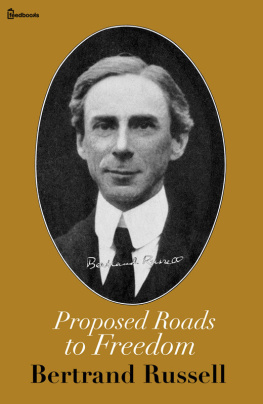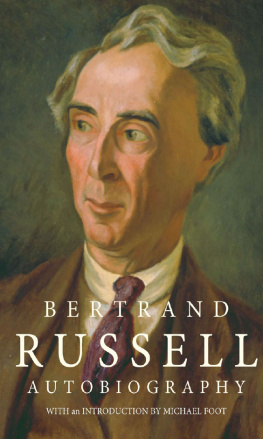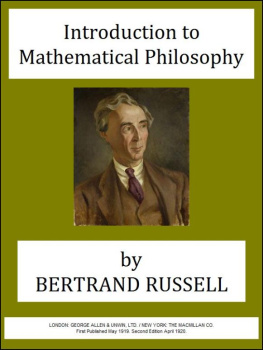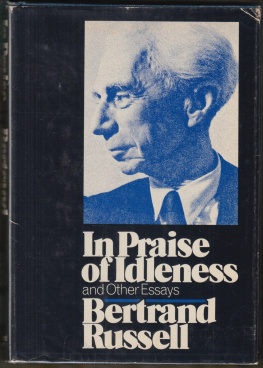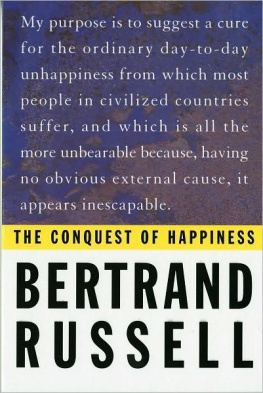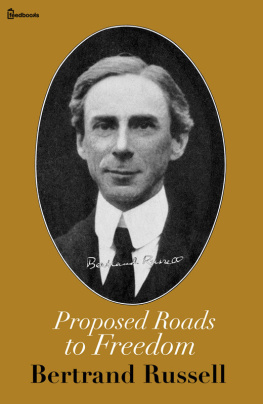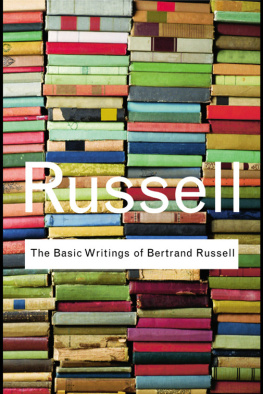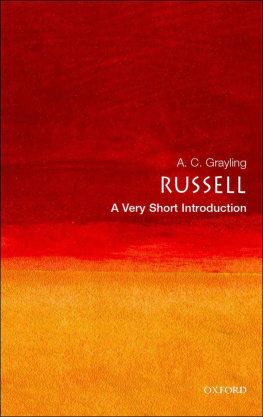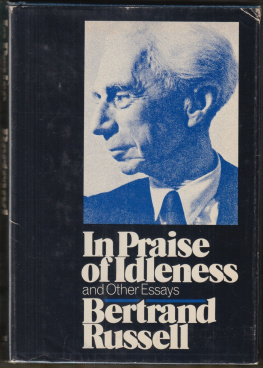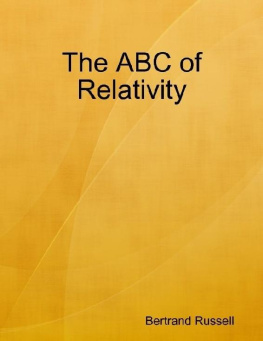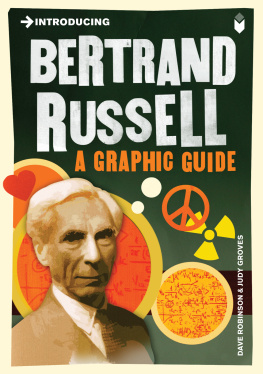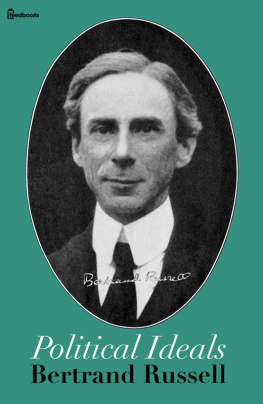Bertrand Russell - Proposed Roads to Freedom
Here you can read online Bertrand Russell - Proposed Roads to Freedom full text of the book (entire story) in english for free. Download pdf and epub, get meaning, cover and reviews about this ebook. year: 1918, publisher: Feedbooks, genre: Politics. Description of the work, (preface) as well as reviews are available. Best literature library LitArk.com created for fans of good reading and offers a wide selection of genres:
Romance novel
Science fiction
Adventure
Detective
Science
History
Home and family
Prose
Art
Politics
Computer
Non-fiction
Religion
Business
Children
Humor
Choose a favorite category and find really read worthwhile books. Enjoy immersion in the world of imagination, feel the emotions of the characters or learn something new for yourself, make an fascinating discovery.
- Book:Proposed Roads to Freedom
- Author:
- Publisher:Feedbooks
- Genre:
- Year:1918
- Rating:5 / 5
- Favourites:Add to favourites
- Your mark:
- 100
- 1
- 2
- 3
- 4
- 5
Proposed Roads to Freedom: summary, description and annotation
We offer to read an annotation, description, summary or preface (depends on what the author of the book "Proposed Roads to Freedom" wrote himself). If you haven't found the necessary information about the book — write in the comments, we will try to find it.
Proposed Roads to Freedom — read online for free the complete book (whole text) full work
Below is the text of the book, divided by pages. System saving the place of the last page read, allows you to conveniently read the book "Proposed Roads to Freedom" online for free, without having to search again every time where you left off. Put a bookmark, and you can go to the page where you finished reading at any time.
Font size:
Interval:
Bookmark:


Published: 1918
Categorie(s): Non-Fiction, Human Science, Philosophy, Socialscience, Political science
Source: Project Gutenberg
Bertrand Arthur William Russell, 3rd Earl Russell, OM, FRS (18May 1872 2 February 1970), was a British philosopher, logician,mathematician, historian, religious sceptic, social reformer,socialist and pacifist. Although he spent the majority of his lifein England, he was born in Wales, where he also died. Russell ledthe British "revolt against idealism" in the early 1900s and isconsidered one of the founders of analytic philosophy along withhis protg Wittgenstein and his elder Frege. He co-authored, withA. N. Whitehead, Principia Mathematica, an attempt to groundmathematics on logic. His philosophical essay "On Denoting" hasbeen considered a "paradigm of philosophy." Both works have had aconsiderable influence on logic, mathematics, set theory,linguistics and analytic philosophy. He was a prominent anti-waractivist, championing free trade between nations andanti-imperialism. Russell was imprisoned for his pacifist activismduring World War I, campaigned against Adolf Hitler, for nucleardisarmament, criticised Soviet totalitarianism and the UnitedStates of America's involvement in the Vietnam War. In 1950,Russell was awarded the Nobel Prize in Literature, "in recognitionof his varied and significant writings in which he championshumanitarian ideals and freedom of thought."
- Mysticism andLogic and Other Essays (1918)
- TheProblems of Philosophy (1912)
- PoliticalIdeals (1917)
http://www.feedbooks.com
Strictly for personal use, do not use this file for commercialpurposes.
T HE attempt toconceive imaginatively a better ordering of human society than thedestructive and cruel chaos in which mankind has hitherto existedis by no means modern: it is at least as old as Plato, whose"Republic" set the model for the Utopias of subsequentphilosophers. Whoever contemplates the world in the light of anideal - whether what he seeks be intellect, or art, or love, orsimple happiness, or all together - must feel a great sorrow in theevils that men needlessly allow to continue, and - if he be a manof force and vital energy - an urgent desire to lead men to therealization of the good which inspires his creative vision. It isthis desire which has been the primary force moving the pioneers ofSocialism and Anarchism, as it moved the inventors of idealcommonwealths in the past. In this there is nothing new. What isnew in Socialism and Anarchism, is that close relation of the idealto the present sufferings of men, which has enabled powerfulpolitical movements to grow out of the hopes of solitary thinkers.It is this that makes Socialism and Anarchism important, and it isthis that makes them dangerous to those who batten, consciously orunconsciously upon the evils of our present order of society.
The great majority of men and women, in ordinary times, passthrough life without ever contemplating or criticising, as a whole,either their own conditions or those of the world at large. Theyfind themselves born into a certain place in society, and theyaccept what each day brings forth, without any effort of thoughtbeyond what the immediate present requires. Almost as instinctivelyas the beasts of the field, they seek the satisfaction of the needsof the moment, without much forethought, and without consideringthat by sufficient effort the whole conditions of their lives couldbe changed. A certain percentage, guided by personal ambition, makethe effort of thought and will which is necessary to placethemselves among the more fortunate members of the community; butvery few among these are seriously concerned to secure for all theadvantages which they seek for themselves. It is only a few rareand exceptional men who have that kind of love toward mankind atlarge that makes them unable to endure patiently the general massof evil and suffering, regardless of any relation it may have totheir own lives. These few, driven by sympathetic pain, will seek,first in thought and then in action, for some way of escape, somenew system of society by which life may become richer, more full ofjoy and less full of preventable evils than it is at present. Butin the past such men have, as a rule, failed to interest the veryvictims of the injustices which they wished to remedy. The moreunfortunate sections of the population have been ignorant,apathetic from excess of toil and weariness, timorous through theimminent danger of immediate punishment by the holders of power,and morally unreliable owing to the loss of self-respect resultingfrom their degradation. To create among such classes any conscious,deliberate effort after general amelioration might have seemed ahopeless task, and indeed in the past it has generally proved so.But the modern world, by the increase of education and the rise inthe standard of comfort among wage-earners, has produced newconditions, more favorable than ever before to the demand forradical reconstruction. It is above all the Socialists, and in alesser degree the Anarchists (chiefly as the inspirers ofSyndicalism), who have become the exponents of this demand.
What is perhaps most remarkable in regard to both Socialism andAnarchism is the association of a widespread popular movement withideals for a better world. The ideals have been elaborated, in thefirst instance, by solitary writers of books, and yet powerfulsections of the wage-earning classes have accepted them as theirguide in the practical affairs of the world. In regard to Socialismthis is evident; but in regard to Anarchism it is only true withsome qualification. Anarchism as such has never been a widespreadcreed, it is only in the modified form of Syndicalism that it hasachieved popularity. Unlike Socialism and Anarchism, Syndicalism isprimarily the outcome, not of an idea, but of an organization: thefact of Trade Union organization came first, and the ideas ofSyndicalism are those which seemed appropriate to this organizationin the opinion of the more advanced French Trade Unions. But theideas are, in the main, derived from Anarchism, and the men whogained acceptance for them were, for the most part, Anarchists.Thus we may regard Syndicalism as the Anarchism of the market-placeas opposed to the Anarchism of isolated individuals which hadpreserved a precarious life throughout the previous decades. Takingthis view, we find in Anarchist-Syndicalism the same combination ofideal and organization as we find in Socialist political parties.It is from this standpoint that our study of these movements willbe undertaken.
Socialism and Anarchism, in their modern form, springrespectively from two protagonists, Marx and Bakunin, who fought alifelong battle, culminating in a split in the first International.We shall begin our study with these two men - first their teaching,and then the organizations which they founded or inspired. Thiswill lead us to the spread of Socialism in more recent years, andthence to the Syndicalist revolt against Socialist emphasis on theState and political action, and to certain movements outside Francewhich have some affinity with Syndicalism - notably the I. W. W. inAmerica and Guild Socialism in England. From this historical surveywe shall pass to the consideration of some of the more pressingproblems of the future, and shall try to decide in what respectsthe world would be happier if the aims of Socialists orSyndicalists were achieved.
Font size:
Interval:
Bookmark:
Similar books «Proposed Roads to Freedom»
Look at similar books to Proposed Roads to Freedom. We have selected literature similar in name and meaning in the hope of providing readers with more options to find new, interesting, not yet read works.
Discussion, reviews of the book Proposed Roads to Freedom and just readers' own opinions. Leave your comments, write what you think about the work, its meaning or the main characters. Specify what exactly you liked and what you didn't like, and why you think so.

